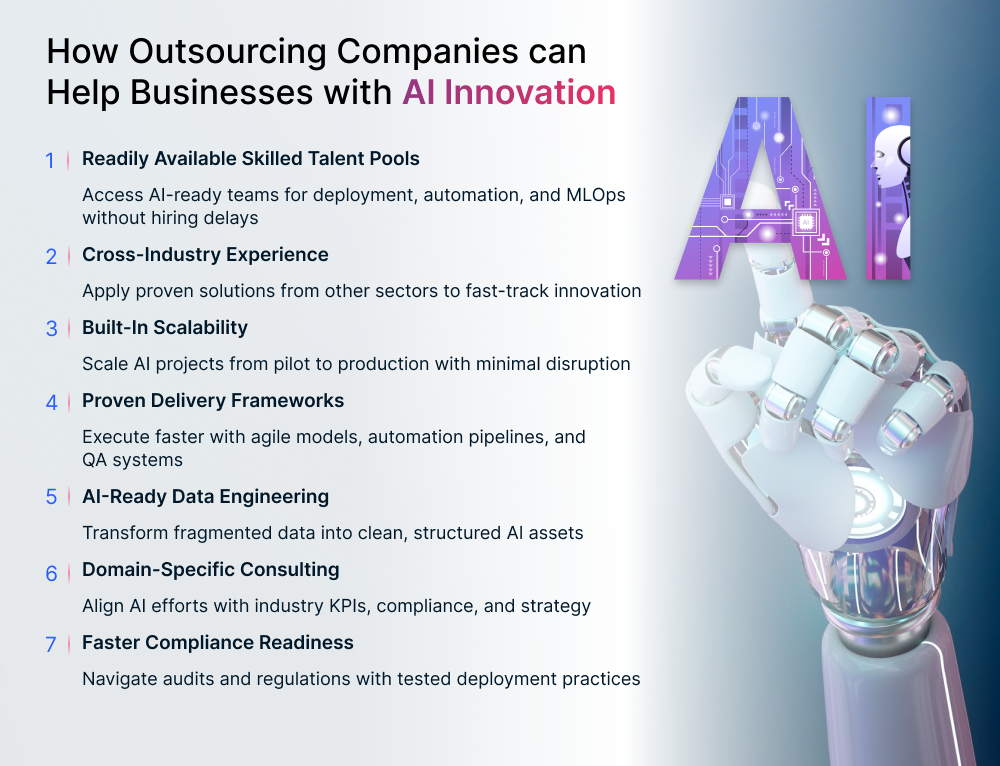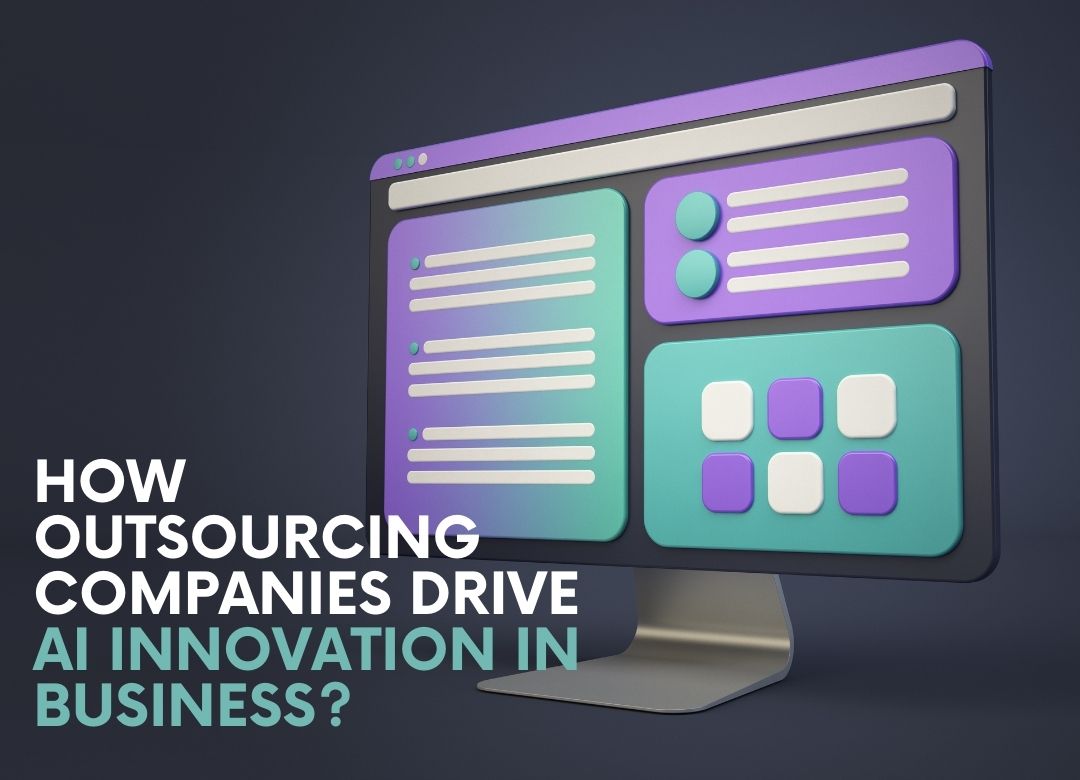AI is gaining momentum rapidly, not just as a means to reduce costs but also as a strategic path to innovation. As organizations race to adopt intelligent systems, many are turning to outsourcing service providers to fill the growing gap between ambition and capability.
From predictive analytics in logistics to generative AI in retail, external AI partners are helping businesses deploy solutions they cannot build internally. And it is working. According to Deloitte, 78% of early AI adopters report measurable efficiency gains, much of it delivered through specialized outsourcing teams.
But the majority still lag behind. McKinsey estimates that 45% of work activities could be automated using existing technology, yet many enterprises remain in pilot mode. Talent shortages, outdated infrastructure, and fragmented data systems often hold them back.
This is where the modern outsourcing service provider steps in, not as a support vendor, but as a strategic execution partner. Equipped with full-stack AI capabilities, they offer a comprehensive suite of solutions, ranging from LLM fine-tuning and scalable MLOps infrastructure to advanced data engineering and robust governance frameworks, all ready to be deployed at enterprise scale.
And they are global. Thanks to cloud platforms and remote delivery models, companies can now access specialized AI talent across time zones without the burden of hiring or retraining internally.
With Gartner predicting that 30% of enterprises will automate over half their network activities by 2026, outsourcing has become more than a workaround. It is a critical lever for scaling AI in time to compete.
How Outsourcing Companies Help with AI Innovation in Businesses
AI may be a strategic priority for most businesses, but turning that strategy into production-ready systems is where many get stuck. Internal teams face real constraints: niche skill shortages, siloed data, legacy infrastructure, and governance uncertainty.
Outsourcing companies aren’t just filling these gaps; they’re accelerating innovation. By working across industries and use cases, they bring repeatable expertise, cross-functional teams, and frameworks that have already been tested in the field.
Here are seven high-impact ways outsourcing service providers are helping organizations unlock AI at scale:

1. Pre-Existing Talent Pools with Practical AI Skills
Outsourcing providers offer access to AI-savvy teams skilled in areas like model deployment, data annotation, MLOps setup, and automation workflows, helping businesses avoid hiring delays and accelerate innovation with immediately available resources.
2. Cross-Industry Experience from Working with Multiple Clients
Exposure to a wide range of industries and use cases allows outsourcing firms to bring tested solutions and breakthrough ideas from one vertical to another. This pattern recognition dramatically shortens the innovation cycle and helps avoid reinventing the wheel.
3. Built-In Scalability for AI Projects
Many AI initiatives fail after the prototype stage due to a lack of scalability. Outsourcing providers bring cloud infrastructure, MLOps practices, and delivery discipline to move from PoC to production without disruption, ensuring ideas don’t get stuck in pilot mode.
4. Established Delivery Frameworks and Workflows
Innovation is not just about ideas; it’s about execution. Outsourcing firms bring proven delivery models, automated pipelines, agile templates, and QA processes that de-risk innovation and compress delivery timelines.
5. Data Engineering Expertise for AI Readiness
Data is the foundation of AI. Most organizations have fragmented or poor-quality data. Outsourcing providers convert raw data into AI-ready formats, making innovation feasible and effective.
6. Domain-Specific Consulting from Real-World Experience
With first-hand experience in similar industries, outsourcing partners offer strategic consulting that aligns innovation with compliance, KPIs, and operational feasibility, adding sharp focus to AI initiatives.
7. Compliance Acceleration in Regulated Industries
Innovation can be blocked by legal and ethical barriers in industries like healthcare or finance. Providers who’ve navigated these successfully for other clients can speed up governance, auditability, and safe deployment.
Together, these advantages position outsourcing companies as powerful enablers of AI innovation—helping businesses move faster, reduce risk, and unlock value at scale. By combining practical expertise with execution muscle, they turn AI ambition into real-world impact.
Case Study: GenAI-Enabled Contract Migration for a Global Data Company
A Fortune 500 Global Data Company faced a significant data migration challenge while transitioning to a new Contract Lifecycle Management (CLM) system. With over 100,000 contracts requiring migration and detailed field-level abstraction, the scale of manual effort required posed risks in cost, time, and quality.
To tackle the complexity and scale, the client outsourced the contract migration process to a service provider that leveraged a generative AI platform (Leah Legal Copilot). The solution combined AI with human oversight for field abstraction, validation, and final document administration.
By outsourcing this operation with GenAI integration, the project saw a dramatic boost in productivity and cost efficiency:
| Approach | Total Time (Hours) | FTEs Required | Time per Document |
|---|---|---|---|
| Traditional Manual | 14,688 | 52 | 1.47 hours |
| GenAI-Enabled (Leah) | 6,900 | 25 | 0.69 hours |
This translated into a 53% productivity gain, cutting down more than half the labor hours while maintaining quality through layered QC processes.
This case illustrates how outsourcing AI-enabled services, especially for large-scale data migration, can unlock substantial efficiencies. It also highlights a growing trend where businesses offload AI-integrated operations to specialized outsourcing service providers rather than attempting to scale in-house.
What’s Next: Future Trends in AI Outsourcing
1. MLOps-as-a-Service Is Becoming Essential
Research indicates that 87% of machine learning models fail to reach production. That’s where MLOps-as-a-Service comes in.
Managing the full AI lifecycle, including training, deployment, monitoring, and model updates, is complex and time-consuming. Instead of building this capability in-house, companies are now outsourcing MLOps to specialized providers who can handle it end-to-end.
It’s not just a trend; it’s a fast-growing market. MLOps was valued at $4.5 billion in 2024 and is expected to grow to $20 billion by 2034, expanding at a Compound Annual Growth Rate (CAGR) of 16.5%.
2. AI Engineering-as-a-Service
AI Engineering-as-a-Service is emerging as a turnkey model for companies that need production-grade AI without building internal teams. It bundles data engineers, ML developers, and DevOps specialists into outcome-driven squads.
According to Precedence Research, the AI engineering market is projected to grow from $17.4 billion in 2025 to $281 billion by 2034, at a CAGR of 36.4% source. From productizing LLM apps to automating workflows, businesses are outsourcing full-stack AI delivery to scale faster and reduce engineering overhead.
3. LLM Fine-Tuning Support
As companies transition from generic AI tools to purpose-built solutions, fine-tuning open-source large language models (LLMs) is becoming increasingly vital. Many organizations lack the internal teams or infrastructure necessary for this level of customization, so they outsource to specialists.
According to Menlo Ventures, 53% of enterprise generative AI was sourced from vendors in 2024 rather than being built in-house. This demonstrates a clear leaning toward third-party support. Partners help prepare data, tune models, and deploy production-ready LLMs without a long internal ramp-up.
4. Model-as-a-Service (MaaS)
Model-as-a-Service (MaaS) enables companies to tap into pre-built, cloud-hosted AI models via APIs, without building or maintaining them themselves. It’s a fast, scalable path to deploying AI capabilities. According to IDC, China’s MaaS market grew to RMB 2.5 billion in H1 2024, with a projected compound annual growth rate of 64.8% through 2028. This explosive growth shows organizations worldwide value ready-made models for speed, efficiency, and cost control.
5. Data Labeling-as-a-Service Becomes Mission-Critical
As AI models grow in complexity, their success hinges not just on algorithms but on the quality of the labeled data behind them. From medical imaging to voice recognition and retail video feeds, businesses today handle vast volumes of unstructured data that must be annotated accurately and at scale.
That’s why many are turning to specialized outsourcing providers for data labeling. These partners bring structured workflows, QA-backed annotation pipelines, and the capacity to handle diverse data types, all without burdening internal teams.
According to Data Bridge Market Research, the global data labeling market is expected to grow from $2.2 billion in 2024 to $8.2 billion by 2032, reflecting the rising demand for outsourced support. In this new landscape, scalable, high-quality data labeling isn’t optional; it’s essential to building reliable, production-ready AI systems.
Conclusion
AI is no longer a side project or an R&D luxury; it has become a foundational pillar of how modern businesses operate, compete, and grow. However, achieving true AI maturity isn’t just about building smarter models. It’s about making high-impact decisions that align speed with scale and vision with execution.
This is where outsourcing emerges as a deliberate strategy for scaling intelligence across the enterprise.
According to CIO, 88% of AI pilots fail to reach production, often due to fragmented data systems, insufficient governance, and lack of deployment expertise. These are organizational bottlenecks that need to be addressed.
A capable outsourcing service provider can close that critical gap, bringing in production-ready MLOps pipelines, scalable cloud infrastructure, and AI teams with the right domain expertise. The result? Faster deployment without sacrificing control.
But, not all providers are created equal. Executives must look beyond general capabilities and vet partners on outcome ownership, data readiness, regulatory alignment, and the ability to adapt to their industry’s nuances.
Because in this next wave of AI adoption, the winners won’t be the biggest companies. They’ll be the most agile, well-partnered, and execution-ready.
And for those who choose wisely, outsourcing won’t just accelerate AI. It will redefine what’s possible next.

Sandeep Kumar is the Founder & CEO of Aitude, a leading AI tools, research, and tutorial platform dedicated to empowering learners, researchers, and innovators. Under his leadership, Aitude has become a go-to resource for those seeking the latest in artificial intelligence, machine learning, computer vision, and development strategies.


